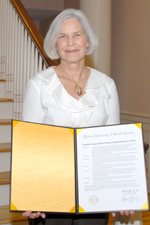|
|
|

|
Campus collaborator guides research success
|
by Cindy Abole
Public Relations
When it comes to legacies, it’s hard to beat Peggy Schachte's record.
After 39 years of service, Schachte will retire in June having founded
the Office of Research Development (ORD) and helped MUSC get to a
record-breaking level of research funding of more than $217 million.
 Peggy Schachte, who
retired June 17, looks forward to gardening. Peggy Schachte, who
retired June 17, looks forward to gardening.
Schachte, as ORD director, mastered various duties during her career as
advisor, facilitator, strategist, advocate and leader to faculty, staff
and the campus’ research community. But no role is probably more
meaningful to her than that as university mentor and friend.
Since 1993, Schachte has led her development team to work closely with
campus researchers as they conceptualize, strategize, discuss and
develop grant proposals for competitive funding. Her team has also
played a strong advisory role in guiding university leadership on the
best opportunities for the institution.
During her career, she’s outlasted six College of Medicine deans and
four university presidents. She has witnessed unprecedented growth
around the institution’s 76-acre campus with the expansion of clinical
services, education and research facilities. In 2005, she received
MUSC's Distinguished Faculty Service Award recognizing her exceptional
contributions to the university.
To celebrate her accomplishments, Schachte was honored with a
resolution of appreciation on Feb. 12 by the MUSC Board of Trustees
highlighting her storied career, leadership and contributions in
providing research support and administrative expertise to advance the
institution’s research mission.
Her arrival on MUSC’s campus in 1969 could not have been more timely. A
Charleston native, Schachte received her undergraduate degree in
English Literature from Duke University. Her first job was in the
Department of Psychiatry, helping edit a new book on Rorschach Theory
and Symbolism. Later, she worked on a psychiatric and mental health
curriculum for medical students. In 1981, she left Charleston to attend
Emory
University and earned her MBA and later returned to the Lowcountry.
In 1981, she was named executive vice president of the Drug Science
Foundation, an organization that helped South Carolina investigators
advance their research and discoveries with patenting, licensing
and partnerships with private industry. It was here that Schachte
honed her skills working with research faculty and university
leadership at MUSC, the University of South Carolina and Clemson
University.
It wasn’t until around the mid-1980s that the MUSC campus was ready to
define and embrace a larger research mission. Discussions took place
among Rosalie Crouch, Ph.D., former College of Graduate Studies dean
and vice provost for research, College of Medicine dean emeritus Layton
McCurdy, M.D., and Schachte to explore ways to provide basic scientists
and clinical researchers with administrative support and guidance in
developing grant applications. In January 1994, the Office of Research
Development opened to assist principal investigators, program leaders,
new investigators and research trainees in this capacity.
“Peggy’s expertise was needed at this time because there was no
infrastructure in place, no training, resources or administrative
support to help coordinate large grants and provide other needed
services,” Crouch said. “The Office of Research Development helped take
MUSC to its next level of research goals.”
Schachte was instrumental in guiding MUSC to success in obtaining three
National Institutes of Health's (NIH) Center for Biomedical Research
Excellence (COBRE) grants supporting major research programs in
cardiovascular biology, oral health and lipidomics. Since 2001, this
series of grants has brought MUSC almost $60 million in research
support.
Associate provost for research Stephen M. Lanier, Ph.D., praised
Schachte for her vision and strategic thinking in pursuing COBRE’s and
other opportunities to provide core resources and seed funding as a
foundation for future growth. She also earned national recognition as
the administrative center director for the National Heart, Lung, and
Blood Institute’s Proteomics Initiative, a national network of 10
research centers.
Schachte and her team were successful in pursuing infrastructure
funding such as shared instrumentation grants and the $20 million
Clinical Translational Science Award grant that was awarded in 2009.
She also was responsible for establishing the key processes and
services for preparing research training and career development grants.
Training grants, according to Lanier, are a signature mark of a quality
academic research institution. ORD regularly sponsors research project
grant retreats for new and experienced investigators to review
proposals and gain constructive feedback.
“Peggy’s helped position MUSC to be competitive in all these grants,”
Lanier said. “She’s provided a great infrastructure for success
throughout these years that will be her legacy.”
$50,000 Peggy Schachte Research Mentor
Award established
In honor of MUSC Office of Research Development director Peggy
Schachte’s commitment and contributions to MUSC, the College of
Medicine and MUSC Foundation have established the Peggy Schachte
Research Mentor Award in the amount of $50,000.
The award recognizes individuals who assist faculty in obtaining
research support from both private and public organizations and
government agencies.
A qualifying honoree can be a faculty mentor or colleague who is widely
recognized in faculty mentoring. The mentorship must have led directly
to a significant research award by an associate professor or lower rank
faculty individual.
Recipients shall be chosen by a committee of faculty-appointed by the
provost who survey the faculties of all colleges to find the individual
who, during the past year, has been an outstanding research mentor. The
award will be presented at the MUSC Faculty Convocation event and will
carry a $1,000 stipend.
To make a donation, visit http://www.musc.edu/giving.
Click
Make a Gift, then College of Medicine.
Friday, June 18,
2010
|
|
|



